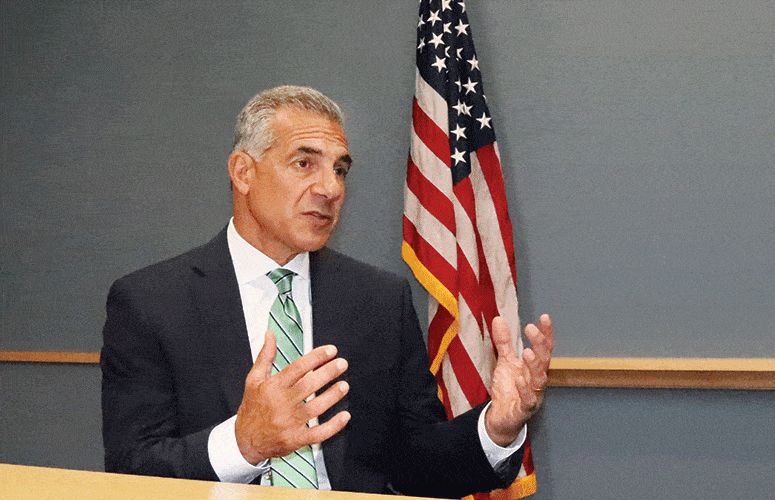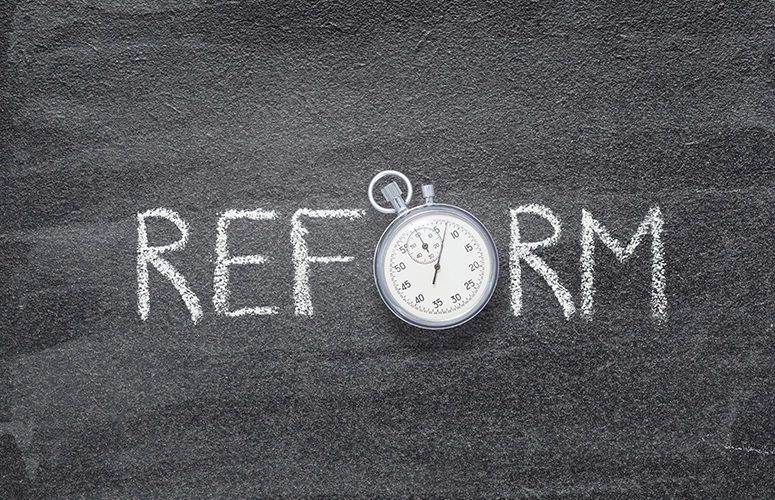
Jack Ciattarelli Q&A
By Anthony Birritteri, Editor-in-Chief On Oct 6, 2021New Jersey Business Editor-in-Chief Anthony Birritteri sat down with Republican gubernatorial candidate Jack Ciattarelli to discuss key business issues such as property taxes, workforce development, government regulations, energy, healthcare, the environment, and how the candidate plans to help the state recover from the COVID-19 pandemic. Below is the Q&A of this interview.
Q: What words of confidence can you give businesses in the state that have suffered so much since the pandemic? A: No state in the union has the transportation nodes New Jersey has between the ports, the airports, rails and highways. No state has the ready, willing and able middle-class workforce that we do. No state has the highest percentage of PhDs per capita that we do. What’s the problem? We don’t have a governor who is cheerleader-in-chief for the business community and we don’t have a governor right now who knows what needs to be done to the tax code.
I want to be a champion for businesses, small businesses in particular. They are the backbone of the New Jersey economy.
There are a number of different things we need to do to our tax code to give small businesses a better chance of not only getting started, but also surviving the most difficult of times.
We should cut the corporate tax rate in half over a five-year period; from its current rate to 5% or 6%. We should also adopt Delaware bylaws for corporate governance. Do we or don’t we want to make New Jersey the most compelling place in the nation to do business?
The first $50,000 of income for small businesses should be tax free. That gives entrepreneurs and business owners the opportunity to recoup their capital investments and reinvest [that money] back into their companies.
For small businesses that have minimum wage payrolls, we should do what Vermont does; allow for the supersizing of the minimum-wage payroll deduction. So, you get to deduct $1.10 for every $1.00 of minimum wage payroll. This lessens the tax obligation to better afford the higher payroll and payroll taxes that were forced upon businesses by increasing the minimum wage.
Also, as governor, I will re-establish the Department of Commerce and rename it the Department of Commerce and Economic Development. It will have a cabinet level commissioner. Reporting into that cabinet will be three deputy commissioners: one responsible for economic development in North Jersey, one for Central Jersey; and one for South Jersey because all three regions are different with their own unique set of resources, attributes and challenges.
Q: If COVID-19 cases continue spiking due to the more contagious variants, would you mandate vaccines, masking and implementing the wholesale type of lockdowns of business and industry, schools and society in general? A: As governor, it is my responsibility to protect the public health and safety, and I will do that. At the same time, I think we have to be careful not to shut down too much for too long. One of the consequences of that is having one out of three small businesses closing their doors forever in the state; 50% of which were owned by minorities and females. My feeling is to share the science, share all the data with the public, advise them as to what is best to do, and allow people to self regulate.
Q: COVID-19 has created an unprecedented hiring crisis while people are not re-entering the workforce. Meanwhile, the state continues to experience one of the highest unemployment rates in the nation. What would you do to assist businesses regarding this crisis? A: Having the nation’s highest unemployment rate and yet seeing help wanted signs everywhere are incongruent. There are hardship cases out there and we need to make sure we take care of our needy citizens. We are our brothers’ and sisters’ keepers. However, I’m also of the opinion that if you make things too easy for too long, people will take the easy way out. We need to get people back to work.
Our Department of Labor should be verifying whether or not someone is looking for work as a condition for receiving unemployment benefits. We are not doing that. These are some of the things that have a huge impact on the labor market and we are seeing it throughout the state with the help wanted signs. We saw it up and down the Jersey Shore where businesses just had 13 weeks to make their money.
This was not the case before the pandemic. This was not the case before unemployment benefits were extended. It was not the case before there was a $300 weekly [federal unemployment] supplement.
Q: What investments are necessary to meet the workforce development needs of businesses now and in the next decade? A: The lack of skilled workers in the trades existed even before the pandemic. We need a greater emphasis on vocational training at an earlier age for our K-12 students. We need to do a better job of identifying 8th, 9th and 10th grade students who already know they are not going to college, and put them on a vocational tract in partnership with industry.
Q: New Jersey is a high tax state. What are your plans to lower the tax burden on businesses and residents? A: The one tax that touches everyone is the property tax. We have to lower it. It is the primary reason why we are considered an unaffordable state. What we need is a new school funding formula; one that will pass muster with the State Supreme Court. I believe I have that formula and it will be reflected in my very first budget. We need a more flatter, and more equitable distribution of state aid for schools.
For example, a $1.10-million home in Jersey City has a property tax bill of just $10,000 a year. When a $400,000 home in Toms River, Bridgewater or Parsipanny pays $15,000 a year in property taxes compared to that Jersey City home, people rightfully are furious. That’s because of the way aid is distributed to schools. This is a story the State Supreme Court doesn’t know because we haven’t been making the right argument before it.
The current state school funding formula is nefarious, arbitrary and unfair. I will make the case that it violates the Equal Benefits Clause of our State Constitution that says no benefit is supposed to suffer at the expense of another. However, I will leave no student or community behind, nor will I adversely affect the quality of education.
Q: Why should New Jersey feel confident that your plan will succeed after decades of high taxes and no perfect solutions? A: Three reasons: I bring a unique background to the governorship. I don’t think there has been an MBA-CPA who has been a two-time small business owner – who has also served at every level of government in the state – run for the highest office. This unique background positions me well for the challenges at hand.
I am telling you what I want to do regarding state funding for schools and lowering property taxes, and what we need to do to our tax code to make New Jersey regionally competitive, because right now we are not. Pennsylvania, Delaware, the Carolinas, Georgia and Florida are eating our lunch. We need to declare an economic war on our neighbors.
Q: The state’s pension system is unsustainable. What are your strategies in making sustainable future payments and reforming the system? A: I am for making a full pension payment, but there is one thing I will never do; borrow to make that payment, which is what Gov. Murphy did this year.
There are different ways to save money in the state budget to afford a full pension payment. I believe state government is bloated. I don’t celebrate putting anyone on the unemployment line, but I do believe that my changes in the tax code will expand the private sector and that will absorb all the jobs that [could possibly be] downsized in state government.
Q: Regulatory processes and litigation costs are also impacting affordability. What are your plans to make reforms in these areas? A: The first job is to listen. I don’t know every industry well. So, I meet with different industries and always ask the same thing: “Give me three reforms that don’t harm the consumer or the environment, and I’m all in.” I will work in partnership with the Legislature to enact those reforms to make New Jersey less regulatory intensive and a much better place to do business.
Q: What are your plans to reduce healthcare costs for employers, employees and their families? A: I would like to see more competition among health insurance providers to lower costs. If that means having out-of-state providers come in and do business here with some regulatory reforms, that’s a discussion that we need to have. There also needs to be greater transparency throughout our healthcare system in terms of pricing.
It also needs to be easier for small businesses to aggregate their purchasing power to buy health insurance. There are many small businesses on Main Street that are making healthcare decisions independent of each other. They can benefit by pooling their interests, creating greater purchasing power and, in theory, lowering insurance costs.
Q: About one-third of the $6-billion American Rescue Plan relief money the state has received has been allocated. What is your strategy concerning the use of the remaining funds? How will you avoid creating problems that cannot be sustained once that money is gone? A: As governor, I will be using the federal CARES act and American Rescue Plan act funds to ensure that our schools will be open. Aside from the loss of life during the pandemic, the greatest problem was that our schools were not open last September, particularly for our younger students and special needs students. This creates the vicious cycle of parents not being able to get back to work. I don’t want to hear that any school can’t be open because of an antiquated ventilation system, for example.
Q: What is your position on schools remaining open if things do change for the worse? A: We will react to what the times demand. From where we sit today, schools will [remain] open. That is the plan. There shouldn’t be a mask mandate for students. That should be a family choice. With where we are today, I would be very comfortable with there being no mask mandate for our K-12 students.
Q: The US Senate has passed a $1-trillion infrastructure bill, of which New Jersey is expected to receive some $12 billion. How can that money best be used so that infrastructure improvements translate into economic improvements and job creation? A: We need to take care of what we have neglected for decades: Our mass transit system, particularly NJ TRANSIT. For years, its capital fund has been used to pay for its operating expenses. It’s time to do everything in order to get NJ TRANSIT up, running, dependable and safe. That would be one of my priorities with infrastructure funds.
Certainly, the Gateway Project is critically important to the regional and national economies.
Q: In the fight to combat climate change by using more sources of renewable energy, how will you ensure that the cost and dependability of these renewable sources will not negatively impact ratepayers? A: By doing something the governor has failed to do: Provide a comprehensive cost analysis as to what the impact will be to the monthly electric bill on your home, apartment or business. That is a form of transparency the governor has an obligation to provide to the people of New Jersey, as he pushes ahead with an energy master plan that is not realistic. It is too much, too soon, too fast. I am fearful that we are going to look back in 10 years at all those wind turbines off the New Jersey coast and say, “What the hell were we thinking?”
I do not have my head in the sand with regard to climate change and human activities’ contribution to it. It’s happening. At the same time, what we need more than anything is a rational transition with regard to our energy policy.
Regarding the economic impacts of building off shore wind turbines, we should never justify the wrong public policy just because it creates jobs. We should never justify the expenditure of taxpayer dollars because it creates jobs. We need a win, win, win. We need to create jobs, we need things that are good public policy, and we need things that are good for the environment.
Q: What is your stance on public safety and what will you do to bring confidence back to communities? A: It is critically important for the governor and the attorney general to make it clear that they have the back of local law enforcement. I am all for reforms and we need them, but we need to support our local law enforcement. [At the same time], I also don’t think it should be hard to get rid of a bad cop.
I would like to see more women in the ranks of local law enforcement. I’d like to see more people of color as police professionals.
Every directive that has come out undermines moral. Police recruitments are down significantly. We used to get 20,000 applicants for State Police jobs per year. Last year, we had 2,000. The caliber of applicant is down, too. Where are we going?
I am also not in favor of getting rid of qualified immunity. If the George Floyd case taught us anything, it’s that if you act egregiously, you will go to prison. Qualified immunity doesn’t protect you.
Q: What are your closing remarks to the New Jersey business community? A: As an MBA-CPA, who has owned two businesses in the state, I understand what the challenges are and I want businesses to know I will be their champion. Additionally, my governorship will not only be regionally competitive. New Jersey will be one of the most compelling states in the union in which to do business.
I believe our democracy, over the course of the pandemic, was hijacked. There was too much executive power and too many executive orders. One thing we have learned from this pandemic is just how powerful the New Jersey governorship is. Maybe it’s too powerful. No governor should have executive power that is extended beyond 6 months.
The Legislature is an equal branch of government. It has to be engaged.






